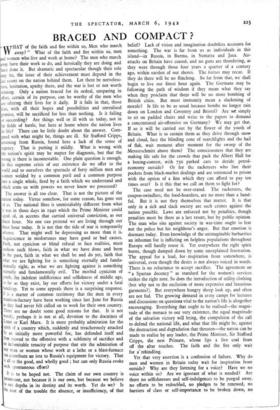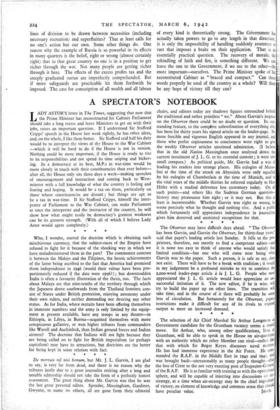BRACED AND COMPACT ?
wHAT of the faith and fire within us, Men who march away? " What of the faith and fire within us, men and women who live and work at home? The men who march away have their work to do, and heroically they are doing and have done it. But dramatic and spectacular though their role may be, the issue of their achievement must depend in the last resort on the nation behind them. Let there be nerveless- ness, hesitation, apathy there, and the war is lost or not worth winning. Only a nation braced for its ordeal, unsparing in effort, certain of its purpose, can be worthy of the men who are offering their lives for it daily. If it fails in that, those lives, with all their hopes and possibilities and unrealised promise, will be sacrificed for less than nothing. Is it failing or succeeding? Are things well or ill with us today, not in far fields of battle, but here at home where the nation lives its life? There can be little doubt about the answer. Com- pared with what might be, things are ill. Sir Stafford Cripps, returning from Russia, found here a lack of the sense of urgency. That is putting it mildly. What is wrong with the nation's spirit may be maper for diagnosis, but that the wrong is there is incontestable. One plain question is enough. In this supreme crisis of our existence do we offer to the world and to ourselves the spectacle of forty million men and women welded by a common peril and a common purpose into a single. whole, fired by a faith which we understand and which arms us with powers we never knew we possessed?
The answer is all too clear. That is not the picture of the nation today. Virtue somehow, for some reason, has gone out of us. The national fibre is unmistakably different from what it was in those days in 1940 which the Prime Minister could speak of, in accents that carried universal conviction, as our finest hour. No one can pretend we are living through our finest hour today. It is not that the tide of _war is temporarily adverse. That might well be depressing us more than it is. Acquiescence in misfortunes may have good or bad causes. Faith, not cynicism or blind refusal to face realities, must cushion such blows, faith in what we have done and been in the past, faith in what we shall be and do yet, faith that what we are fighting for is something eternally and funda- mentally right, as what we are fighting against is something eternally and fundamentally evil. The morbid cynicism of youth, the indolent indifference and selfishness of middle age, so far as they exist, lay our efforts for victory under a fatal handicap. Yet to some appeals there is a surprising response. It is a matter of common testimony that the men in every munition-factory have been working since last June for Russia as they had never felt called on to work for their own country. There are no doubt some good reasons for that. It- is not merely, perhaps it is not at all; devotion to the doctrines of Lenin or Karl Marx. It is more probably admiration for the spirit of a country which, suddenly and treacherously attacked by an initially more powerful foe, has defended itself and the moved to the offensive with a sublimity of sacrifice and an indomitable tenacity of purpose that stir the admiration of anY man or woman whose work at a lathe or a blast-furnace can contribute an iota to Russia's equipment for victory. That is all to the good, and wholly good ; but can only Russia evoke lath spontaneous effort?
It is to be hoped not The claim of our own country is Paramount, not because it is our own, but because we believe to our depths in its destiny and its worth. Yet do we? Is the root of the trouble the absence, or insufficiency, of that belief? Lack of vision and imagination doubtless accounts for something. The war is far from us .as individuals in this island—in Russia, in Burma, in Sumatra and Java. Air- attacks on Britain have ceased, and no guns are thundering, as they were through those four years a quarter of a century ago, within earshot of our shores. The bittzes may recur. If they do there will be no flinching. So far from that, we shall begin to live our finest hour again. The Germans may be following the path of wisdom if they mean what they say when they proclaim that there will be no more bombing of British cities. But must immunity mean a slackening of morale? Is life to be as usual because bombs no longer rain down on London and Coventry and Bristol? Are we simply to sit on padded chairs and write to the papers to demand a concentrated air-offensive on Germany? We may get that. If so it will be carried out by the flower of the youth of Britain. What is to sustain them as they drive through snow and cloud, face the blinding cone of searchlights and the hail of flak, wait moment after moment for the swoop of the Messerschmitt above them? The consciousness that they are making life safe for the crowds that pack the Albert Hall for a boxing-contest, with 750 parked cars to deride petrol- economy outside? Or for the racketeers who line their pockets from black-market dealings and are sentenced to prison with the option of a fine which they can afford to pay ten times over? Is it this that we call on them to fight for?
The case need not be over-stated. The racketeers, the coupon-swindlers, the food-hoarders, are no more than a hand- ful. But it is not they themselves that matter. It is that only in a sick and slack society are such crimes agiinst the nation possible. Laws are enforced not by penalties, though penalties must be there as a last resort, but by public opinion. The man who sins against society in war-time ought to fear not the police but his neighbour's anger. But that emotion is dormant today. Even knowledge of the unimaginable barbarities- an inhuman foe is inflicting on helpless populations throughout Europe will hardly rouse it. Yet everywhere the right spirit burns, though damped down by some unexplained frustration. The appeal for a lead, for. inspiration from somewhere, is universal, even though the desire is not always voiced in words. There is no reluctance to accept sacrifice. The agreement on " a Spartan decency " as standard for the wofnen's services strikes the right note. So does the introduction of utility clothing (but why not to the exclusion of more expensive and luiturious garments?). But everywhere hungry sheep look up, and often are not fed. The growing demand in army camps for lectures and discussions on questions vital to the nation's life is altogether encouraging. Everything that ought to be realised—the magni- tude of the menace to our very existence, the equal magnitude of the salvation victory will bring, the compulsion of the call to defend the national life, and what that life might be, against the destruction and degradation that threaten—the nation can be made to realise by any leader, the Prime Minister, Sir Stafford Cripps, the new Primate, whose lips a live coal from off the altar touches. The faith and the fire only wait for a rekindling Yet that very assertion is a confession of failure. Why do men and women in Britain today wait for inspiration from outside? Why are they listening for a voice? Have we no voice within us? Are we ignorant of what is needed? Are there no selfishnesses and self-indulgences to be purged away, no efforts to be redoubled, no pledges to be renewed, no barriers of class or self-importance to be broken down, no lines of division to be drawn between necessities (including necessary recreation) and superfluities? That at least calls for no one's action but our own. Some other things do. One reason why the example of Russia is so powerful in its effects in many quarters is the belief, right or wrong (almost certainly right) that in that great country no one is in a position to get richer through the war. Not many people are getting richer through it here. The effects of the excess profits tax and the steeply graduated surtax are imperfectly comprehended. But if more safeguards are practicable let them forthwith be imposed. The case for conscription of all wealth and all labour of every kind is theoretically strong. The Government has actually 'taken powers to go to any length in that direction; it is only the impossibility of handling suddenly resources so vast that imposes a brake on their application. That is an essentially practical question. The recovery of morale, the rekindling of faith and fire, is something different. We can leave the one to the Government, if we see to the other—the more important—ourselves. The Prime Minister spoke of his reconstituted Cabinet as " braced and compact." Can those words properly be used of the country as a whole? Will there be any 'hope of victory till they can?



























 Previous page
Previous page